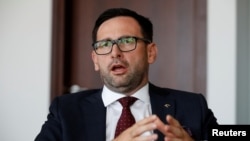When a Warsaw court blocked a state-controlled oil refinery from gobbling up a large regional news group last month, many celebrated the decision as a press freedom victory.
But celebrations may be short-lived. The next day, Daniel Obajtek, chief executive of the PKN Orlen refinery, declared that the deal to acquire Polska Press would stay in place.
There is "no legal basis for limiting the company's rights resulting from the acquired shares," Obajtek tweeted. A few days later, PKN Orlen released its annual financial report showing that the acquisition had taken place before the court's decision and that it remains legally binding.
So it goes in Poland, where analysts see attempts by state-backed firms to nationalize private media as part of a strategy by the right-wing ruling Law and Justice (PiS) party to keep journalists in check.
"In the past, we witnessed similar situations when (party leader) Jaroslaw Kaczyński would question certain judgments," Roman Imielski, deputy editor-in-chief of Poland's largest broadsheet, Gazeta Wyborcza, told VOA. "This is what the state of the rule of law is in today's Poland: The authorities do not respect court rulings when they're not to their liking."
The Media Freedom Rapid Response, which tracks press freedom violations in European Union member states, said in a report earlier this year that the PiS had "pioneered a form of media capture unique within the European Union" with the Polska Press takeover.
The tactic takes inspiration from Hungarian leader Viktor Orban, who has used connections with Hungarian business tycoons to buy control of independent news outlets, the report said.
Kaczyński has publicly praised the Hungary model, saying in 2011 that a day would come when Warsaw would look like Budapest. Ten years on, the Law and Justice party is in control of the country's Parliament, with the media firmly in its sights.
As a chief architect of government policies, Kaczyński has said that once legal reforms are in place, the media would be next in line for a makeover.
The acquisition of Polska Press, which was owned by German company Verlagsgruppe Passau, appears to fit into that plan.
"The ruling party is trying to persuade media publishers to take a more balanced stance toward the government. But they cannot do it to foreign-owned companies," said Leszek Jażdżewski, a columnist and editor-in-chief of the Polish Liberte magazine.
"They are trying to nationalize them. In fact, they say to 'repolonize,' but in practice it is renationalization because there are no private funds available in Poland to take over those media from the hands of foreign companies," Jażdżewski said.
"Repolonization" — a term circulating since the ruling party took power — refers to efforts to bring the country's media and banks under Polish ownership.
Foreign investors account for about 40% ownership and 75% of circulation in Polish media, according to Deutsche Welle, the German public broadcaster. For Polska Press, which includes 20 regional newspapers, 120 local weeklies and numerous news websites, that is a large chunk of media reach in the key election battleground regions.
The PiS has also said that German- and American-owned media are "manipulated" by politicians from those countries, and it has complained of foreign influence in the country's media. After a series of critical articles by Polish correspondents appeared in German media during Poland's presidential election last year, the Ministry of Foreign Affairs summoned a member of the German Embassy and told them Poland was "firmly opposed to German lies and manipulation."
In a statement to VOA, the prime minister's office denied that its intention is to establish political control over publishers.
"The government has no plans to nationalize the media, nor has it ever had such plans. We have repeatedly indicated the importance of the origin of the capital used to finance media outlets as a factor determining national information sovereignty," Sebastian Kęciek, International Projects Department director at the prime minister’s office, told VOA.
Kęciek said that before Polska Press's acquisition, 17 of the 20 largest regional daily papers were owned by a German company, and he portrayed the deal as a lifesaver for the media outfit.
"A German investor wanted to dispose of his shares in Polska Press, and a Polish company was ready to acquire them. The investment of Polish capital will make it possible to save many of them from bankruptcy," Kęciek told VOA.
So far, only one other takeover has been proposed. Agora, which owns Gazeta Wyborcza, tried to acquire Eurozet, which would have given it control of 70% of the market. But Poland's anti-monopoly watchdog blocked the attempt.
Under attack
The Media Freedom Rapid Response mission warned that despite visible pluralism in media, the ruling party "continued to wage a multipronged attack on independent media in an effort to muzzle critical reporting and undermine watchdog journalism."
Authorities introduced retroactive tax penalties and fines, launched antitrust investigations to stop mergers and applied administrative pressure, media watchdogs said. The government previously said it was working on a proposed bill that would limit foreign ownership, but further details have not been released.
Polityka and Newsweek, liberal-leaning weeklies critical of the government, along with Gazeta Wyborcza, lost all advertising from state-owned companies when the PiS came to power in 2015.
Print subscriptions from courts, most ministries and other public sector entities were also withdrawn in a move that media watchdogs said appeared to be part of a strategy.
Gazeta Wyborcza has found itself fighting an onslaught of legal challenges since 2015.
One of the first independent newspapers established after the fall of communism in 1989, the daily does not hesitate to publish investigative reports exposing corruption. But that has led to nearly 70 lawsuits, including from members of Parliament and politicians, including Justice Minister Zbigniew Ziobro.
"We win 99% of the cases, but it takes a lot of energy from our legal team, journalists and editorial staff," Imielski told VOA.
Any newspaper playing the role of government watchdog and exposing scandal or fraud risks being sued, Imielski said. "But never before 2015 had we witnessed such an avalanche of legal action by the government," he said.
Kęciek, from the prime minister's office, told VOA that the existence of Gazeta Wyborcza is proof the government is not trying to limit press freedom.
"The largest Polish daily and weekly, Gazeta Wyborcza and Polityka, are Polish-owned, and yet they both criticize the Law and Justice government relentlessly," he said.
Asked what he sees as the biggest danger to media freedom in Poland, Imielski was quick to point to Hungary, where few truly independent outlets remain.
So did Jażdżewski, of Liberte.
"If you want to understand what the Law and Justice could do, you have to look at Orban," the journalist said. Orban has proved skillful at avoiding punishment from the European Union for eroding democratic institutions and media freedom.
Still, Imielski said, Poland has a long way to go to resemble Hungary, and recent internal divisions within the ruling coalition may create hurdles. But he has little doubt authorities will attempt to continue to tighten their grip on the commercial media.
"Their dream is to build a country where there's almost no critics and all major media outlets are dependent on the authorities, and their role is not to inform the public, but act in favor of the ruling party,” Imielski said.







